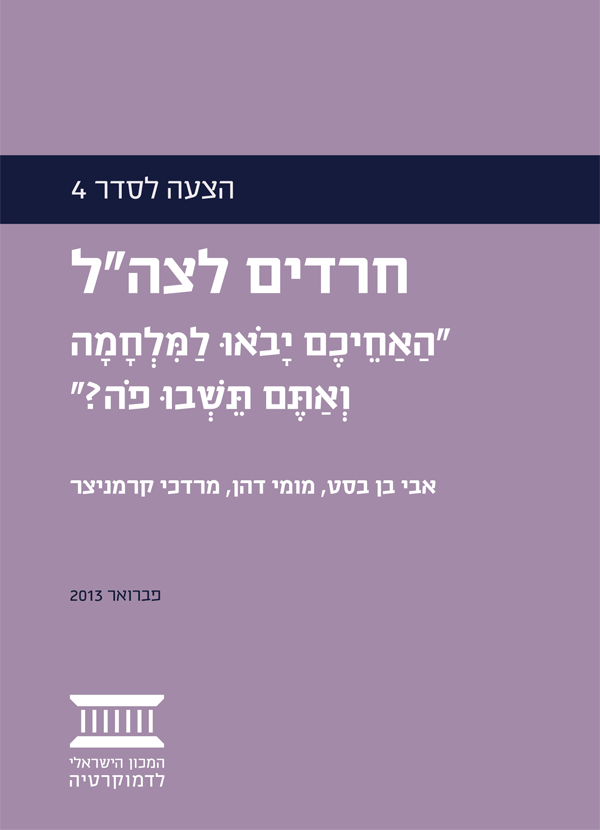A Proposal for Integrating the Ultra-Orthodox into the IDF
“Shall your brethren go to war, and shall you sit here?” (Numbers 32:6)
Motion for the Agenda No. 4
- Written By: Avi Ben-Bassat, Prof. Momi Dahan, Prof. Mordechai Kremnitzer
- Publication Date:
- Cover Type: Online Booklet | Hebrew
- Number Of Pages: 46 Pages
A proposal for integrating the Haredi community into the Israeli military and the economy by Professors Avi Ben Bassat, Momi Dahan, and Mordechai Kremnitzer. (English abstract plus full Hebrew proposal.)
Note that this is one of two IDI proposals to integrate Haredim into the Israeli army and economy. An additional proposal by Prof. Yedidia Z. Stern and Attorney Haim Zicherman can be found here.
The following recommendations by Professors Avi Ben Bassat, Momi Dahan, and Mordechai Kremnitzer are intended to achieve the following goals: to equalize the burden of military service in the Israel Defense Forces gradually, to shorten the period of compulsory service for all soldiers, to increase motivation for military service among the Israeli population as a whole, to strengthen solidarity among all sectors of Israeli society, to increase Haredi participation in the workforce, and to promote respect and tolerance for Torah study.
Above all, the proposed arrangement is intended to comply with the provisions of the Basic Law: Human Dignity and Freedom, as interpreted by the courts.
- The number of ultra-Orthodox men drafted into the IDF will increase gradually over the course of eight years, based on conscription rates among those obligated to serve. During the first year, 10% of the 18-year-old ultra-Orthodox cohort will be drafted. Each year thereafter, the conscription quota for the relevant cohort will increase by 10 percentage points, until it reaches 80% in the eighth year.
- Beginning in the eighth year, a full exemption will be granted to yeshiva students who are recognized as exceptionally gifted scholars. Between 5% and 10% of ultra-Orthodox men who are eligible for the draft will receive this status, based on examinations administered by an independent body.
- The age of conscription for ultra-Orthodox men will be 18, as it is for all other recruits.
- All draft-eligible ultra-Orthodox men will undergo the standard IDF induction process to determine their fitness for military service. Those who are deemed unfit for military service for health or other reasons will receive a full exemption from service, just like their counterparts in the general population.
- The IDF alone will determine which conscripts are most suited for service, based on its needs and the abilities of the recruits.
- Once the aforementioned quota of conscripts has been filled (see 1 above), the IDF will be entitled to grant a one-year deferment of military service to young men who have been deemed fit for service but have submitted a declaration that "Torah study is their profession." This will follow an interview by a military rabbi who evaluates the young man’s aptitude for yeshiva study. The declaration will name the specific yeshiva in which studies will take place. During this year of deferral, the young men will be forbidden to engage in any activity other than study in the specified yeshiva (including working or enrolling in another institution). At the end of the one-year deferment, students will be offered the opportunity to enlist in the IDF. If they choose not to enlist, they will receive a permanent exemption from military service. This exemption will not be contingent on continued Torah study and will not preclude employment.
- The IDF will be responsible for verifying the declaration that serves as the basis of the deferral. In order to do so, it will periodically check whether those who received deferrals are actually studying in yeshiva. Young men who are eligible for the draft yet violate the terms of their deferment will be drafted immediately. The IDF will receive dedicated resources to enforce the law.
- A permanent and unconditional exemption will be given to all ultra-Orthodox men who are aged 20 or above on the day the law is enacted.
- Stipends for married yeshiva students and state budgetary support for yeshivot will be reduced by 50% during the first year of the plan. From the second year on, state allocations to yeshiva students and yeshivot will be eliminated completely.
- Compulsory service for all soldiers in the IDF will be shortened gradually to two years, in line with the recommendations made by the Ben-Bassat Committee in 2006.
- As part of the plan to reduce the length of military service in general, all tracks with shortened military service will be eliminated. No special tracks entailing shortened military service will be created for any sector of the population.
- All IDF conscripts who are required to do pre-military service will be paid minimum wage during their preliminary training.
- No civilian service program will be created for ultra-Orthodox men, because such programs do not reduce inequality in sharing the burden of military service and actually increase inequality in sharing the economic burden. Military service is the only option that is being presented in this proposal.
- The scope of civilian service for the general population will be reduced greatly. The IDF alone will be authorized to decide whether a person who is required to serve in the military should perform civilian service instead. Civilian service will be considered only after compulsory service in the IDF has been shortened to two years.
Prof. Avi Ben-Bassat is a senior fellow at the Israel Democracy Institute and a professor of economics in the Department of Economics at the Hebrew University of Jerusalem and the Center for Academic Studies in Or Yehuda.
Prof. Momi Dahan is a senior fellow at the Israel Democracy Institute and head of the School of Public Policy at the Hebrew University of Jerusalem.
Prof. Mordechai Kremnitzer is vice president of research at the Israel Democracy Institute and Professor Emeritus of the Faculty of Law at the Hebrew University of Jerusalem.

